Major world events of 2022
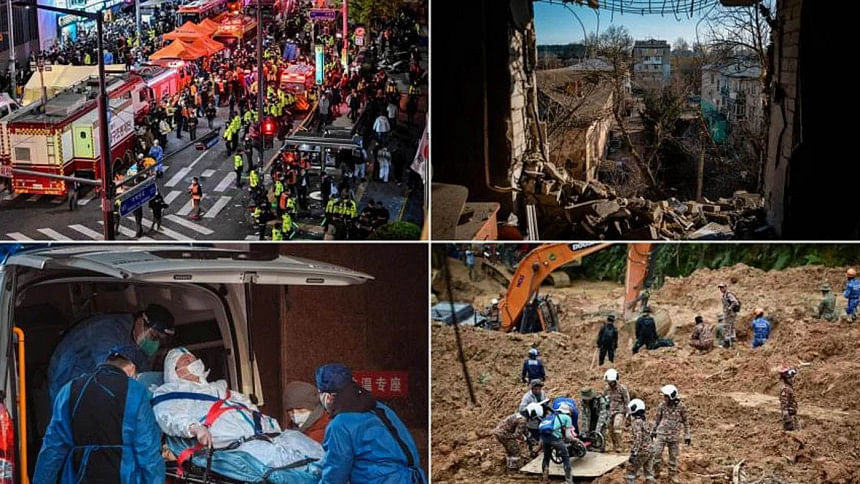
It was a year when death came abruptly to what otherwise were days of communal celebrations; when Britain lost a queen and Japan, its former premier; when inept leaders – corrupted by hubris – fell; and when nature again refused to be ignored. It was a year of another devastating war in Europe.
It was, of course, still a year of Covid-19. But there lies the year's brightest spot. As 2022 draws to a close, even the last bulwark, China, has realised that it cannot push back the tide to protect its citizens from a plague that the rest of the world has learnt to live with.
Here were some of the key events of 2022.
Lives snuffed out
Stampede in Indonesia
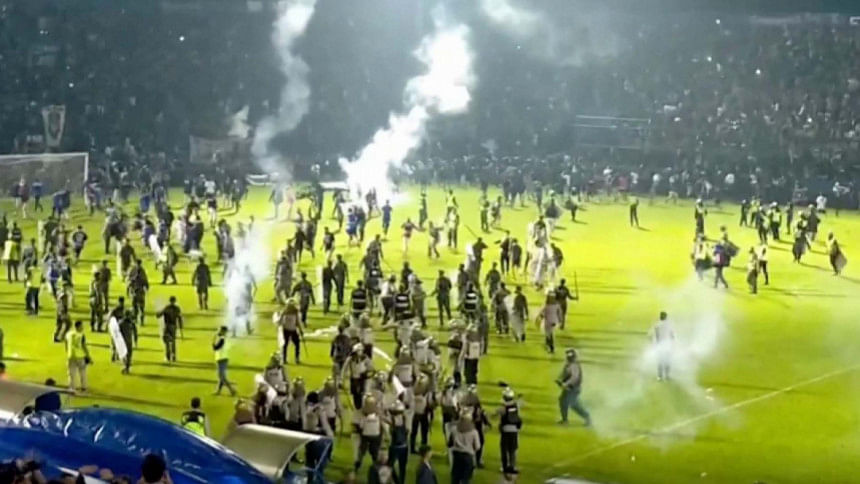
On Oct 1, a football match at Kanjuruhan Stadium in Malang city in Indonesia's East Java province ended in a stunning upset for the home team. Thousands of fans descended onto the pitch after the game, mostly to vent their frustrations over the loss. Policemen, armed with shields and batons, tried to break up the mob.
Fans were soon lobbing missiles of empty bottles and debris at the police and overturning police cars. Fearing a riot that could overwhelm them, the police began firing volleys of tear gas, setting off a deadly stampede for the exit.
By the end of the night, 133 people were dead, either trampled or suffocated from the copious amount of tear gas that blanketed the stadium.
Crowd crush in South Korea
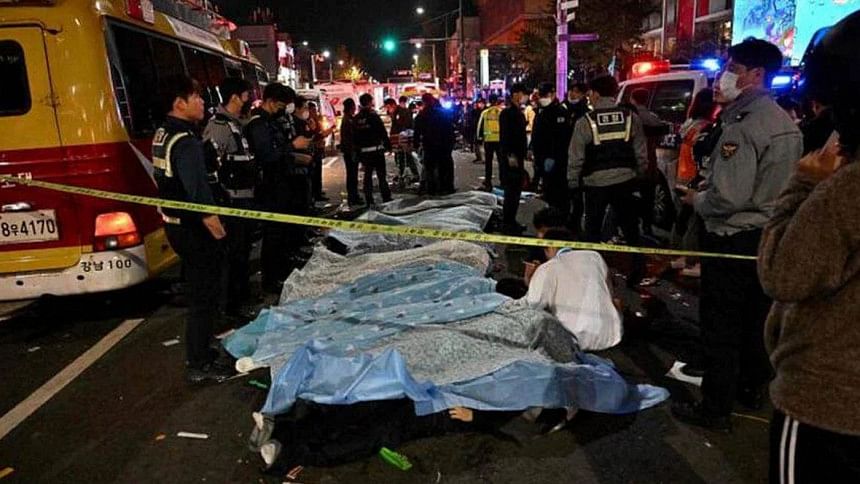
It was supposed to be a joyous evening to celebrate the first Halloween since South Korea lifted most of its Covid-19 restrictions.
On Oct 29, more than 100,000 people descended on Itaewon, a hip, trendy neighbourhood in the capital. Most were in their 20s. They were young, they were finally free and they were set on letting loose from sundown to sunrise.
But as early as 6.30pm, Itaewon was already becoming dangerously overcrowded. For nearly four hours, partygoers were making emergency calls, pleading with police to disperse rowdy crowds amassing in narrow back alleys that house the district's hottest nightclubs and bars.
One 5m-wide, sloping alley was quickly turning into a death trap. By 10pm, people began dying in the alley. It took emergency personnel more than 30 minutes to mount a broad response. An hour passed before rescuers finally managed to pull all the injured and unconscious from the alley and begin cardiopulmonary resuscitation.
Bodies were later lined up on the street and covered with blue blankets. The tally at the end of the night would be 158 lives lost.
Landslide in Malaysia

On Dec 16, at past 2am, some 450,000 cubic m of earth, rock and debris were dislodged from a mountain slope into a campsite downhill in Batang Kali town, in Malaysia's Selangor state.
Within seconds, this mass was bearing down on some 90 campers still asleep inside their tents. They were parents with their young children, out on a nature adventure. They were teachers on a group break.
Those who survived recalled hearing a loud, menacing rumbling, and feeling the ground shaking.
By daylight, rescuers had already retrieved more than 20 bodies. They would recover 10 more by Dec 22, with the body of the final victim – a young boy – recovered on Dec 24.
There were reports of death embraces: a mother and her daughter, a man and his dog. There were at least eight children who died, still in their sleeping garb.
Russia wages war in Ukraine
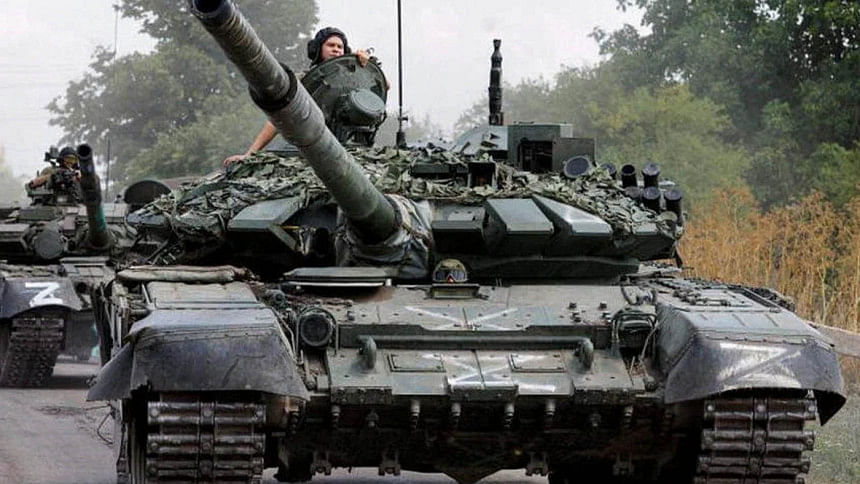
When Russia's tanks rolled into neighbouring Ukraine on Feb 24, many expected the war to end swiftly with the fall of the country. Russia's generals reportedly told their men that it would be a "walk in the park". Even the West's war analysts were expecting Kyiv to fall in a matter of days or weeks.
But 10 months on, President Vladimir Putin's "special military operation" is bogged down. In some places, it is in retreat.
Still, the war looks likely to drag on in 2023.
Putin, knowing his reputation is on the line, is willing to put even more bodies into what his soldiers are calling the "meat grinder".
Ukrainian President Volodymyr Zelensky, with momentum on his side, has said he will talk peace only when all Russian troops are gone from Ukrainian soil. To cap what has been so far a relatively winning year for him, he made an unannounced trip to Washington to make an impassioned, in-person appeal to American lawmakers for more weapons and aid.
Russian forces remain in control of vast swathes of Ukraine's east and south, and they are digging in.
Ukrainian troops, despite their advantages in war machines and morale, will find it much more challenging to reclaim territory from Russian forces.
In all likelihood, the front will settle into a stalemate in which neither army can take much land despite intense fighting.
Final farewell for world leaders
Queen Elizabeth's reign ends

Queen Elizabeth II died on Sept 8 at the age of 96. Her reign was the longest of any monarch in British history, spanning 70 years and 15 prime ministers.
Her seven-decade reign bookended the lives of and defined the times for tens of millions of Britons. She was one of their last living links to World War II and the twilight of Britain's imperial age. She was the one constant in their lives.
On the occasion of her Silver Jubilee, she recalled the pledge that she had made on a visit to South Africa 30 years before.
"When I was 21, I pledged my life to the service of our people and I asked for God's help to make good that vow. Although that vow was made in my salad days, when I was green in judgment, I do not regret, or retract, one word of it."
Shinzo Abe falls to assassin's bullet

It was an unremarkable day. On July 8, former prime minister Shinzo Abe was speaking just before noon at a small political rally outside a train station in the western city of Nara, when a man in his 40s sneaked up behind him and fired a gun he had cobbled together using instructions he got online. The man managed to fire again before Mr Abe's bodyguards tackled him to the ground.
Despite an hours-long effort to save him, Mr Abe did not survive. A bullet had severed an artery under his collarbone, and he died of massive blood loss.
Moments after his death was announced, Japan reacted with sadness. But as details about the assailant came to light, the tone changed, and the focus shifted to Mr Abe's Liberal Democratic Party and its decades-old ties to the Unification Church.
The alleged assassin, Tetsuya Yamagami, told police he had held a longstanding grudge against the church because his mother had donated close to 100 million yen (S$1 million) to it, bankrupting the family.
Abe did not belong to the church. But his death unearthed ties of some of Japan's most powerful politicians to a South Korea-based fringe religious group accused of preying on vulnerable people.
Year of reckoning
Downing Street's musical chairs
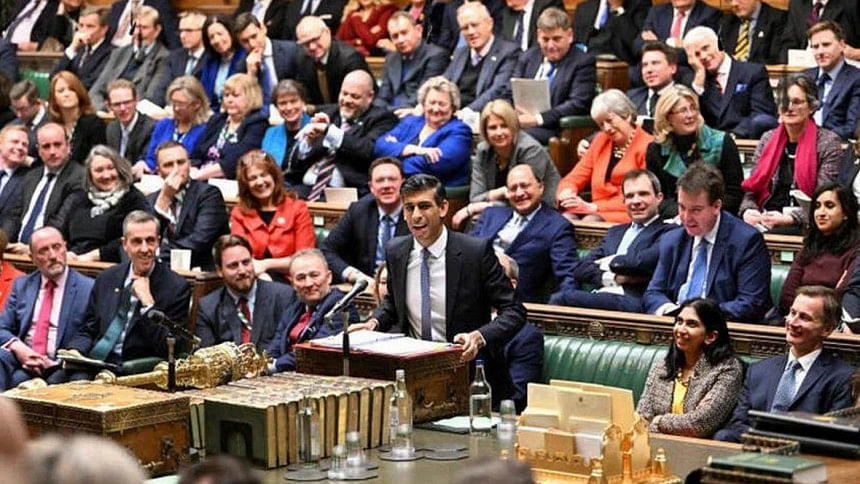
In less than a year, Britain cycled through three prime ministers.
Boris Johnson resigned in July after it was revealed that he had appointed a party whip accused of sexually inappropriate behaviour. It was the last straw coming after several scandals, including one called "partygate' in which he had violated his own government's strict Covid-19 lockdown rules in 2020 by attending gatherings.
Johnson was replaced by Liz Truss, who became Britain's shortest-serving prime minister after she, too, was forced to step down after just 49 days. This came after she stubbornly pushed £45 billion (S$73 billion) in unfunded tax cuts that succeeded only in crashing the pound, spooking markets and undermining Britain's credibility around the world.
Rishi Sunak, a former Chancellor of the Exchequer, is now in charge. But he is handicapped by a weak mandate and a deeply divided Conservative Party, even as he deals with soaring prices that have forced labour unions to mount a wave of strikes to demand higher pay.
Turmoil in South Asia
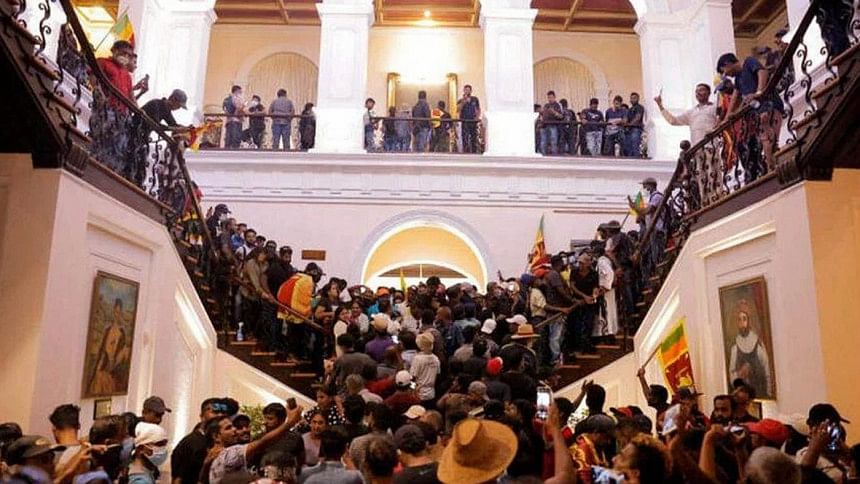
Pakistan's Imran Khan stepped down as prime minister in April after losing in a stand-off with Parliament.
Then Sri Lankan President Gotabaya Rajapaksa, meanwhile, was forced to flee his country after protesters stormed his official residence.
In both cases, the two nations' crashing economies – double-digit inflation, mounting public debts, and food and fuel shortages, caused in part by the Covid-19 pandemic and the war in Ukraine, but also by government's ineptitude – were the catalyst.
Anwar Ibrahim finally becomes PM

Anwar Ibrahim was sworn in as Malaysia's prime minister in November, capping a three-decade political journey that saw him survive an off-again, on-again rivalry with Dr Mahathir Mohamad and nearly 10 years of incarceration on sodomy and corruption charges that he says were politically motivated.
Anwar rose to the top as another rival and former tormentor, Najib Razak, saw his fortune go from bad to worse. In August, Malaysia's top court upheld Najib's graft conviction and 12-year jail sentence linked to the looting of the 1MDB state fund. He became the first former prime minister to be jailed.
Nature's fury

Catastrophic floods, crop-wilting droughts and record heatwaves again served as reminders of how fast the planet's climate is shifting.
Record heatwaves damaged crops from China to Europe, while drought brought millions to the point of starvation in the Horn of Africa.
Floods supercharged by climate change engulfed Pakistan, affecting 33 million people and causing some US$30 billion (S$40.5 billion) in damage and economic losses.
"The year 2022 will be one of the hottest years on earth, with all the phenomena that go with higher temperatures," said climate scientist Robert Vautard, head of France's Pierre-Simon Laplace Institute. "Unfortunately, this is just the beginning."
Goodbye, Covid-19

Much of the world emerged from Covid-19 in 2022. Masks came off, schools resumed in-person classes, and holiday travel and large celebrations became possible once again.
The focus now is on China.
After years of pursuing a zero-tolerance approach to combating the coronavirus, China abruptly lifted nearly all health restrictions in December.
But with the way the reopening is unfolding, health experts worry that China may not be trying to flatten the curve, but is instead building up herd immunity quickly by letting the virus rip.
A study by the Institute of Health Metrics and Evaluation based in the University of Washington projected that China could potentially see "well over one million" deaths in 2023.
What else happened
There were other events in 2022 that will shape the year ahead. China launched massive war games near Taiwan following a visit to the island by US House of Representatives Speaker Nancy Pelosi. North Korea fired an almost daily barrage of rockets and missiles towards the sea off the coast of the Korean peninsula and over Japan's airspace, and is said to be preparing for another nuclear test.
In Iran, a young woman's death while in the custody of the morality police set off massive protests that pose the most serious challenge yet to the authority of that nation's supreme leader.
Roe v Wade was overturned and, with it, the constitutional protection for abortion in the United States.
President Joe Biden and the Democrats prevailed in the midterm elections over Donald Trump's "red wave" that never was.
Crypto imploded and billionaire Elon Musk bought Twitter.
Copyright: The Straits Times/Asia News Network

 For all latest news, follow The Daily Star's Google News channel.
For all latest news, follow The Daily Star's Google News channel. 








Comments